- Home
- Jane Lebak
Pickup Notes Page 32
Pickup Notes Read online
Page 32
Viv came down. “She called the cops!”
“Do you want to be arrested?” Mom folded her arms. “Well? What have I been sacrificing for all these years if you’re just going to run away? Is that any kind of gratitude?”
I stared, open-mouthed.
Viv said, “But I want to be on my own!”
“You can’t live on your own! Look what happens when you try. I let Josie come here because your grandmother could use her, but you? You wouldn’t last fifteen seconds.” She pointed to Viv. “In the car. You’re going home.”
Viv’s eyes glistened. “But—”
“Do it, Vivvy!” Mom returned her glare to me as Viv slunk to the car. “Now you unload all your furniture and get everything back upstairs where you belong. You can’t just turn tail and run from your family like that. You owe it to your grandmother.”
My breath came jerky. I trembled.
Behind me, Shreya squeezed my shoulder.
Mom took a step forward. “Now, Josie!”
Shreya’s hand tightened.
My throat hurt. “I’m not going back.”
She got right in my face. “Then you owe me. Think of all the things I’ve done for you.”
I squared my shoulders. “I don’t have to pay you back for raising me. We’re just going to have to live with an uneven score.”
She cocked her head. “Where are you going to go? Who else except your family would take you in?”
I opened my hands. “Who’s my family?” I gestured to everyone around me. “The ones who care about me, who accept me, who help me, they’re my family.” I faked a smile. “I think I’m going to do okay.”
She folded her arms. “There’s a police officer right here. Do you want to go to jail?”
I smirked. “For running away from home at age twenty-four?”
Mom said, “You’re a thief, and I can prove it.” She pointed to the battered viola case in the back of the van. “That’s not your viola.”
I said, “That’s the viola I’ve had since fifth grade.”
“Does this case look new?” She yanked it out of the van, unsettling the topmost boxes. “Your grandfather brought that viola from Europe. It’s a family heirloom over a hundred years old, and you stole it out of his house while he was dying.”
I turned to the officer, who said, “Ma’am, if you’d like to file a report, we’ll investigate.”
I said, “Actually, let’s investigate now.” I removed the viola and pivoted it until the sunlight shone through the F-holes. Thank you, bass bar, for having what I needed. I said to the officer, “Can you please look in here and tell her what it says?”
Any luthier would have laughed after one glance at the finish, but why argue when we had facts?
The officer squinted. “What am I looking for? Oh, there!” He snickered. “Ma’am, it’s stamped with ‘Eastman And Co, 1988.’”
White with fury, my mother hurled the case at my feet, and the bow popped out along with the rosin. I bent to reassemble everything. With any luck she’d kick me in the face and then no one would ever have to wonder how she felt about me. But my luck had run out. She took a step toward her car.
Harrison said, “Mrs. Mikalos? Did you know that once it’s probated, a will is public record? Among all the officer’s paperwork is a copy of your father-in-law’s will.”
She stopped mid-exit.
“Failing to fully execute that will was a felony.” He gave a disarming smile. Now I realized why he’d gone for a button-down shirt and a blazer: he looked like an attorney. “You’re still within the statute of limitations, so you may want to think twice before filing a false report.”
I bit my lip as I reassembled the viola case. Give a violinist a spotlight....
He added, “Hector Mikalos’ will specified a cash inheritance for Josephine in addition to the viola. Since those funds were never dispersed, I strongly suggest you use that money now, to make good on the stolen rent.”
“I hope you’re happy.” My mother towered over me, and I stood because on second thought, a kick in the face wasn’t an attractive option. “You’ve been nothing but a disappointment. You are no longer a part of my family.”
She stalked back to her car, gunned the engine, and took off with a jump that should have impressed both Josh and Ed.
And that… That was how I became an orphan.
I buried my face in my hands, inhaling hard. Ed gripped my shoulder, and I backed into him, letting him take my weight.
Behind me, Shreya said, “Harry? Is any of that legal stuff true?”
Harrison seemed amused. “Who knows? I told you I know every lawyer in Manhattan. I didn’t say I consulted them.”
The officer said something about everything being finished, and Ed told him he could go. I thanked him, and he shook my hand.
Ed said, “That was a long time coming, sweetie.”
Shreya said, “So...time to go apartment-hunting?”
I said nothing for a long time, only let my chosen family surround me.
TWENTY-NINE
“And now, please welcome to the Westchester County Festival of Concert Music... The Boroughs String Quartet.”
Polite applause. It turns out a music festival is more like a big wedding than Yankee Stadium greeting the Rolling Stones, but hey, we’d promised to give them a show, and we were going to do it.
We took the stage and set ourselves up, Harrison for once not double-checking his tuning because he’d already checked it fifty-eight times. Although all four of us were nervous, there really wasn’t any need to be. The organizers had sandwiched our bandshell performance in between two chamber groups of equal caliber: no record deal, no performance in Carnegie Hall this season, and not looking too good for the next one either.
As we got settled to start with our fusion of “Baker Street,” I glanced at Harrison for our cue but instead found him staring into the audience with surprise. I followed his gaze to find several nasty faces among the couple hundred picnic blankets. These business-suited folks had foregone their sandwiches and juice boxes in favor of recording devices.
Ah. The legal eagles.
Shaken, Harrison started us, and shortly we had Shreya dancing.
So far I’d had a blast: speaking to other musicians was cool, but I spent my time wandering through the tents, stuffing their promotional material into a canvas bag. Josh called it my “reconnaissance mission.” But let’s be practical: some of these guys had paid a lot of money for professional publicists, so why not learn?
And yes, we were still a quartet.
After moving me out, Harrison and Josh had gone to war, exchanging email and text salvos over the bylaws of the Boroughs String Quartet. Shreya and I haunted the group chats with increasing trepidation as the four of us hammered out rules one or the other hated (such as “All group-related expenses must be distributed equally” or Harrison’s snarky, “notifications of personal upheavals that render one homeless”).
Once Harrison got onboard with the idea of bylaws, though, he’d embraced it with an enthusiasm usually reserved for animal activists attending a dog fight. He was lobbying hard for monthly “state of the quartet” meetings. After the first day, with a blizzard of texts suggesting possible guidelines, Shreya blessed us with her own suggestion: “Messages on a single topic will be capped at one hundred per day.” But despite the arguing, bickering and bantering, and the occasional jibe of “The floor recognizes Josephine Mikalos,” we were still here.
After our first fusion, the audience applauded; well, all except the legal nasties. Harrison and Shreya looked at me, and I stood.
“I’d like to thank you for coming to hear us,” I said, “except you didn’t come for us. You’re staking out spots for the Arturo Delmoni String Quartet.” That drew some laughter, although none from the suits. They were three men and a whip-thin woman, and bet me that woman was the Witch Lawyer I spoke to.
Well, now she could darn well listen to me. “Just so you know w
hose captive audience you are,” I said with a smile, “we’re the Boroughs String Quartet. Harrison Archer is our illustrious first violinist and commander-in-chief. Shreya Ramachandran is our second violinist, although as you can hear, she’s second fiddle to no one.” I pointed them out as I went along, and I kept my eyes on the legals. They were definitely recording us, and I’m pretty sure that was forbidden in the rules for the venue. But hey, if someone’s going to break the law, who better? “Josh Galen is our cellist, but there isn’t anything funny to say about him.” This time it was Josh who laughed as I met his eyes. “And I’m Josephine Mikalos, your violist.”
Shreya said into the other mike. “Joey, why do so many people take an instant dislike to the viola?”
I grinned. “It saves time.”
Then we played our fusion of “Yesterday.”
I’d moved on Thursday. My new landlady? The late bride. She’d forgotten until, oh, last month that she’d need to unload her Red Hook condo, so Harrison sweet-talked her into renting it to me: a studio in a refurbished factory, a whole fifteen-by-twenty feet. My three-quarter bathroom fit a toilet, shower, and sink so tightly they interlocked, and the sole window gazed on a continuous traffic jam. My kitchen table was a cardboard box, and at night, I unfolded my futon to make a bed.
Was it okay? I loved it.
I loved it not because I could lock the doors or because I had a lease, but because it used to be the factory’s executive meeting room. The soundproof meeting room. Walls that once kept out the clangs of a metal press now kept in the song of a viola. The first day, I blasted my stereo and strained in the hallway to hear even the high notes. This was a musician’s apartment.
I’d gotten calls and texts from my mother and sister, all of them threatening, plus emotional blackmail messages from my grandmother and a cousin I hadn’t heard from since 2006, until I blocked every single family member. My money reappeared in my account hours before I needed to write a check to pay for the new place.
I only returned to the old house once, at midnight with Josh’s dad and a borrowed humane trap. An hour later, we raced across Brooklyn with a furious, nameless caged cat, Ed demonstrating where Josh got his driving skills.
When I’d asked, “Is Josh ever going to forgive me?” Ed only replied, “Well...I wouldn’t say never.”
When we finished “Yesterday,” the audience was silent at first, followed by applause louder than before. Looking at the crowd, I found people drawn to the outskirts of the field. The legal team, of course, remained completely out of place where they were getting their illicit video.
Harrison started the intro to our newest mix: Boston’s “More Than A Feeling” wrapped around a Beethoven string trio, with the cello voicing the bass guitar part and the second violin handling the vocals. But while he did that, I locked eyes with the Witch Lawyer. Her face, so tight she might have been wearing a document clamp on the back of her head, showed no expression whatsoever.
And that was a shame. You know, if you’re going to work with world-class musicians, even as their bulldog, you should at least like music.
We played, but I kept glancing at her, and that’s when it all made sense. Josh and Shreya and Harrison had kept telling me this the whole time, that we’d always have our music. This woman, without a soul and without any kind of appreciation for anything, she couldn’t steal our music because in some respect she couldn’t even hold it. So while I played, I moved in my seat, and then I took to my feet and joined Shreya in her dance because this was freedom.
We were motion and love and yearning. We were two melody lines singing words the heart could never speak.
We ended. Everyone was applauding.
Before Harrison could introduce our fourth piece, I put my bow back to the strings and unfurled the riff from “Hotel California.”
Witch Lawyer glared at one of her minions, and I grinned. Sometimes you just had to make a noise.
Harrison shook his head, and Shreya looked startled. He put his hand over the mike and whispered, “Are you out of your mind?”
I looked him in the eye. And I grinned.
I started playing again. One phrase later, Shreya joined me, and we went through the “Hotel California” riff in a round. Then I repeated a phrase and we caught up to one another to play in unison, at least until Harrison broke in to begin the Mozart section.
The string fusion: forged to appease a drunken bride, the force that tightened the first of the strings on the instrument that was our quartet. Our second CD, our first news coverage, our first lawsuit, our second fight.
The Witch Lawyer had grabbed one of her minions by the arm and was stalking up to the stage. This was about to get truly interesting, so I kept playing.
We reached Shreya’s solo, and she took off, doing her own riff and then sending it back to me. She and I had never played it this way before, so I repeated it. (The musician’s credo: when in doubt, repeat.) She repeated. We played in unison. She took it over again and improvised.
Our fusion turned into a game of tennis, the violin and the viola throwing the line back and forth, sometimes modulated, sometimes ornamented (and a violinist like Shreya could ornament the hell out of anything) and at one point inverted.
We passed play back to the guys. The four of us together brought it to the next riff, and then Shreya took it over again, this time solo.
Harrison signaled to cut all our repeats. Shreya unleashed every bit of love into her violin, so alive that it looked like the bow was flying, and she was deaf to everything other than her song in what amounted to a public jam session.
At some point, Shreya grabbed that cadenza by the heart and finished. Everyone was on their feet, the crowd cheering.
I turned, and the lawyers were positioned alongside the emcee in the alcove, humorless as a coconut and twice as soft.
The blood went to my head, but I bowed alongside Shreya. Maybe I’d pass out, but the more I listened to the applause, the more I just let it work through me. We were alive. We were music.
Harrison and Josh also bowed, and then Josh took my elbow to guide me toward the back of the stage. The audience was still clapping, and I turned for a last wave back at them before we got out of sight.
With so little room in the alcove, the Witch Lawyer was practically breathing in my face. I forced a smile.
She glared at me, arms folded.
I gestured toward the crowd, still applauding.
Staring into my eyes, at last she said, “Fine. You can have your rights. Have your attorney call my office on Monday.”
She turned, and all the men in suits and holding recording devices followed in her wake.
That’s when it came to me what she’d just said: this was permission. Permission to play it now, play it forever, put it on our album, cut them a royalty check—it was official. We were good to go. Sorry for the inconvenience of demanding your head in a bag.
Josh guided me out of the back, and I blinked in the sunlight. Permission. We’d done it. People loved it, and the lawyers had caved.
The oncoming group said something like “Gee, thanks.” The festival’s photographer started taking pictures of our blue-haired violinist, and I just wanted to set my viola back in the case. My body was shaking with a delayed reaction.
“Hey! You guys did great!” Josh’s father rushed up to us. He slapped Josh on the back, then bear-hugged me. A minute later, Shreya’s parents were with us, and also Harrison’s. Josh’s brother ribbed him about finally playing something worthwhile.
My family wasn’t there. But then again, this was my chosen family, and they were all around me.
“Um, excuse me?” Someone tapped me on the arm, and I turned to find a reporter. “I’m Tom Ethan from the New York Post. Would you mind answering a few questions?”
He faced Josh, who at first backed away, then squared his shoulders. “We’d l-love to.” Standing beside me, he picked his words with care. “B-but first, I nnn-need to tell you that I stu-stutter. I
t might take me a few s-seconds longer to say something, but don’t feel you need to st-stop me or finish my sentences.”
The reporter started asking questions. Josh answered. The man bought a CD. We ended up at our tent talking to other excited musicians who wanted to try the same thing, one who propositioned Shreya to join his group (or maybe was hitting on her), and someone who recognized Shreya from her previous band (with Shreya telling a confused Harrison she’d explain later).
Josh came to stand behind me, and I tensed.
He said, “Did you name the cat?”
I didn’t turn. “There’s no use in naming something that doesn’t come when you call it. But yeah, I named it Tiger.”
While Harrison sold CDs (had his pupils formed actual dollar signs?) and Shreya traded war stories with another musician, Josh bent over our table to write something. I leaned over his hands to watch what he drew.
Under his pencil appeared a hedgehog and a tiger-like cat with a viola and a cello, the instruments leaning against one another. The notes above them formed a G chord.
He wrapped his arms around my shoulders.
I wove my fingers through his and pulled him closer, my back to his chest, and there I stayed in silence, secure and surrounded, no questions, no doubts. Harmony and hedgehogs. I closed my eyes. This was permission. This was forgiveness.
Thank you
Thank you so much for reading Pickup Notes! This was such a fun book to write, and I hope you had fun reading it too.
If you liked Pickup Notes, I think you’d also like Honest And For True, so I’ll include a chapter of it following this note. There are no violins, but there are wrenches and little whisks and a wisecracking guardian angel who’s hopelessly fascinated with the Rumours album. It’s about Lee, another New York City girl like Joey, who works as an auto mechanic, slings puns with that aforementioned guardian angel, and has a teensie problem telling the truth.
So many people helped out along the way with Pickup Notes, but I need to give a special shout-out to the online stuttering community who helped make Josh authentic: Daniele Rossi of Stuttering Is Cool, Greg Snyder of the Stuttering.Me podcast, Heather Baier, and Pamela Mertz of Make Room For The Stuttering. Daniele and Heather were also early readers, and because I didn’t realize different stutterers use different stuttering patterns, Josh (it turns out) stutters the same way Dr. Snyder does. Thank you so much, guys.

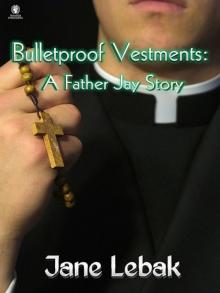 Bulletproof Vestments
Bulletproof Vestments The Wrong Enemy
The Wrong Enemy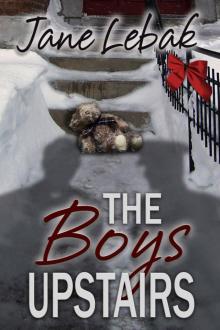 The Boys Upstairs (Father Jay Book 2)
The Boys Upstairs (Father Jay Book 2)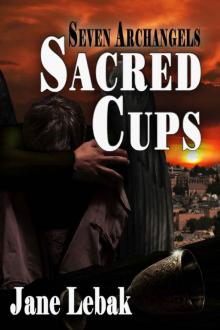 Sacred Cups (Seven Archangels Book 2)
Sacred Cups (Seven Archangels Book 2)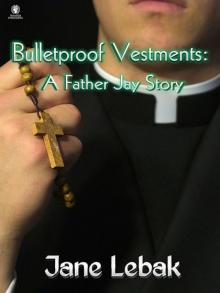 Bulletproof Vestments: A Father Jay Story
Bulletproof Vestments: A Father Jay Story An Arrow In Flight (Seven Archangels Book 1)
An Arrow In Flight (Seven Archangels Book 1)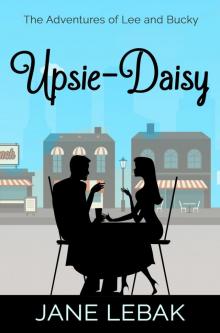 Upsie-Daisy
Upsie-Daisy Shattered Walls (Seven Archangels Book 3)
Shattered Walls (Seven Archangels Book 3)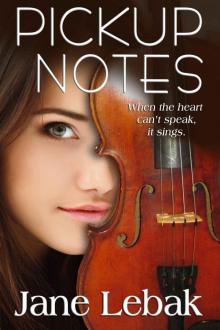 Pickup Notes
Pickup Notes